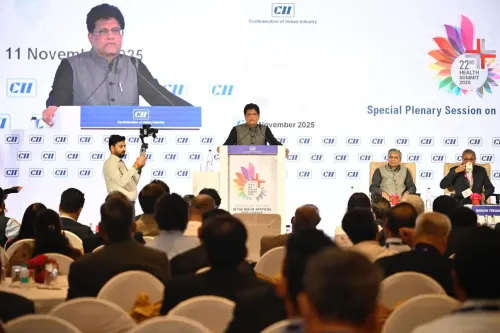How can mental well-being prevent heart disease in India?

Synopsis
Key Takeaways
- Mental well-being is essential for heart disease prevention.
- Integration of mental health into healthcare practices is vital.
- Schools can significantly influence youth health.
- Routine screenings and awareness are crucial for early detection.
- Community involvement enhances heart health initiatives.
New Delhi, Sep 26 (NationPress) Mental well-being plays a pivotal role in the prevention of chronic and non-communicable diseases, particularly heart disease, as stated by experts on Friday.
India has recently experienced a notable increase in heart disease cases, especially among young adults and even children.
“To tackle India’s heart health crisis, we must transition from a treatment-focused approach to fostering authentic health-seeking behaviors within our families, educational institutions, and communities,” emphasized Rajesh Bhushan, former Secretary of the Ministry of Health and Family Welfare, during a city event leading up to World Heart Day on September 29.
The expert called for the integration of mental health into healthcare practices and urged educational institutions to promote mental wellness among children.
“In addition to regular physical activity and stress management, it is essential to cultivate mental health from an early age within families and reinforce it in schools. Life should be viewed as a marathon, not a sprint; thus, young individuals require guidance to develop patience, resilience, and balance, rather than being forced into early burnout. Schools can significantly transform this scenario by replacing detrimental habits with healthier options, promoting mental wellness, and encouraging physical activity,” Bhushan noted.
Experts further discussed the effects of mental stress, environmental pollution, and poor lifestyle choices, alongside the critical need for timely preventive screenings.
They underscored how digital health, wearable technology, and artificial intelligence are revolutionizing heart care delivery across India, effectively bridging the urban-rural gap.
“Cardiovascular disease is no longer restricted to the elderly; India is witnessing heart attacks occurring much earlier, with almost 60 percent of cases arising in individuals below the age of 55. Prevention is the most cost-effective approach; it requires only a fraction—about one-sixth—of the expenses associated with treatment. To make genuine progress, we must enhance hypertension control, incorporate mental health into heart care, and foster awareness right from schools. Addressing heart disease necessitates a collective effort—robust government policies, participation from the private sector, and societal acceptance of healthier choices,” stated Dr. Sandeep Bansal, Director at Vardhman Mahavir Medical College & Safdarjung Hospital.
Anil Rajput, Chairperson of the Advisory Council at the Illness to Wellness Foundation, praised the government's various initiatives aimed at improving heart health—from the National Programme for Prevention and Control of Cancer, Diabetes, Cardiovascular Diseases and Stroke (NPCDCS) to Ayushman Arogya Mandirs and PM-JAY—providing preventive care, early detection, and financial security for treatment.
Other specialists emphasized the significance of routine screenings, emotional health, balanced lifestyles, and comprehensive lifestyle modifications. They advocated for a national movement focused on heart health—anchored in awareness, preventive screenings, mental well-being, emergency preparedness (including CPR education), and community engagement.








